introduction
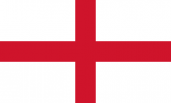
With its temperate climate, rough and undulating coastline punctuated with sandy beaches, bays, points and coves the surf potential for England is enormous. It has east, west and south facing coastlines all within a relatively short drive from each other and all picking up swell, so there is usually somewhere with waves if you know where to look. Weather in England can be very changeable due to influence of Arctic and continental weather systems, hence the nations obsession with it. This means swells can quickly appear and disappear so it is worth keeping your eye on those forecasts. A phrase worth mentioning about the English weather – if you don’t like it, wait a minute! England has the second largest surf population in Europe, but with plenty of surf spots to go round you can usually escape the crowds and find a peak or two to yourself. Wintertime can also keep crowds at bay and throw up some world class surf if you’re prepared to don necessary rubber!
history

Magnus Manske; King Henry VIII; 12.05.05
The history of England is long and varied one. It begins in prehistoric days when Stonehenge was erected around 2200 B.C. At Around the start of the 1st century, England was under Roman jurisdiction along with its neighbouring country Wales and most of Europe. At around 400 A.D. the Romano-British formed various independent kingdoms. This lasted until the 5th century when the Germanic Anglo-Saxons gradually took over English ruling during a series of invasions from the South East. A.D. 800 saw the start of frequent attacks from the North East by Vikings or Norseman of Scandinavia follow by the successful invasion of the Normans from Northern France in 1066 A.D. Following this in the Middle Ages there was much civil unrest and political wars raged both at home and with neighbouring countries leading to England conquering Wales. During the renaissance around 15th – 17th centuries England was ruled by the Tudors and the colonisation of the new world began. The industrial revolution began and reigned in the 18th and 19th centuries and England and Wales were united with Scotland to form Great Britain which ruled a worldwide empire, but these days it has mostly been disbanded.
surfing
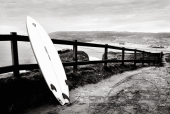
Matt Smith: Surfboard at Perranporth, crystalbluephotography.com
England is one of the most underrated Places on the world surf map. It is host to many great reefs, points and beaches and boasts some of the greatest diversity in coastline imaginable from flat sandy beaches and dunes to towering cliffs featuring tiny winding paths down to secluded spots. The myth of England’s lacklustre surf is quickly being dispelled. The progression in wetsuit technology to combat the chilly waters and the media hype surrounding surfing is making it more and more accessible to the English general public and breaks are feeling the pressure of growth yearly. English surfing is here to stay. Despite its relatively small size, England has many miles of explorable coastline for the travelling surfer to discover. From the mild blue gulf stream fed waters of Devon and Cornwall up to the steely grey cooler waters pounding the North Eastern kelp covered slab reefs, there are waves a plenty. Surfing in England began over forty years ago on the North coast of Cornwall and the area has dominated the British surfing scene ever since. The surf here is created by huge depressions in the North Atlantic, which drives swell in and eastward direction to the beaches of North Cornwall and Devon. Quickly catching up with Cornwall as one of the UKs Mecca’s of surf is the North East coast around Yorkshire. The reefs and beaches come alive here when depressions travel eastwardly from the far North Atlantic and across to Scandinavia, funnelling swells down into the North Sea, these are often met with the prevailing offshore south westerly winds to create perfect surfing conditions.
travel
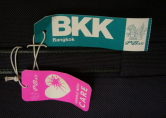
Matthias Sebulke: Baggage tags; 05.11.05
Getting There:
By road.
England is an island which means it not possible to drive there outside of Great Britain. If you are a motorist planning on driving there you have one of two choices:
You can get there by one of the many car ferry services that cross to Great Britain from mainland Europe, Ireland, the Channel Islands, the Isle of Man or the Isle of White.
You can also get there by the channel tunnel or chunnel as it is also known. The chunnel runs from Calais in France to Folkestone in England, it is a train service that carries both vehicles and passengers.
Flying.
England has many airports that are serviced by many airlines worldwide. Some of the major international ones are: London Heathrow, London Gatwick, Bristol, Birmingham, East Midlands, Manchester, Leeds and Bradford.
By train.
From Europe, Eurostar links to England via the channel tunnel and trains run from Paris, France and Brussels in Belgium onto St. Pancras, London.Regular services also run to and from England to Scotland and Wales.Non UK residence can obtain a Britrail pass which enables unlimited travel around England on one ticket.
Getting Around.
Getting around England is not a problem; it is well serviced with an excellent network of roads, rail track, ferry services and domestic airports. Taxis are readily available with many companies in most towns and cities. Buses are frequent and numerous and England has one of the highest densities of rail network per square mile in the world.
where to stay

Alessandro Zangrilli: A child sleeping; 23.04.07
England offers the usual Western assortment of sleeping options including:
Hostels Both private institutions and those part of a hostelling networking (which may require membership so check ahead) usually offer dorm style accommodations, sometimes with a simple breakfast included (think toast and tea). Many hostels in popular destination cities fill up during the busy summer season, so try to book ahead or at least call before you arrive.
Bed and Breakfasts can range from a single room in a private home to large historical buildings with dozens of rooms. In many towns the tourist office has a list of rooms available and can help you call around.
Hotels in cities and towns, and near motorway junctions, as well as some grand Country House Hotels.
Motels are mostly in the form of large chains such as Travel Inn and Travelodge, with hundreds across the country.
Camping There is a widespread network in country locations of campsites which welcome tents, caravans, or motorhomes. Sites may welcome some or all of these. But don't expect to find many close to cities and major tourist attractions. While the rooms are generally comfortable, rooms at the lower end of the price scale may be small and usually come without air conditioning, cable TV, coffee machines, and other amenities. In very inexpensive accommodation, for example in dormitory style hostels, towels and soap may not be provided.
what to pack
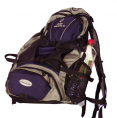
Benutzer: Backpack; 19.09.07
There is no shortage of supplies available in England, you can more or less buy anything you need on arrival here but here are a few pointers to avoid getting caught out.
A lot of what you get up to outside of the surf in England will depend on the weather. Although England can have some fine warm summers they are much too often washed out with rain and in the winter, swell season, it’s worse. Needless to say bring a water proof jacket as a bare minimum if you’re staying in hotels etc. If you’ve opted to camp make sure you have plenty of quick drying warm clothes and that your tent and bags are also waterproof. Also bring a good quality 4 season sleeping bag.
During the warmer months (May-September) it would be wise to pack sun cream and Sunglasses, though England has the stigma of bad weather the sun can still get high and hot and nicely toast the unwary – especially out on the water.
There are lots of great walking tracks around this green island with some stunning views to take in, if that sounds like your cuppa tea bring some sturdy walking boots as well as your waterproofs.
The nightlife in England can be legendary and caters for every taste from quite country pubs to hardcore dance clubs that go off 24hrs a day some of the bigger cities. If you plan on going clubbing bring shoes and a collared shirt as door staff can be strict with the dress code.
Of course, don’t forget a plentiful supply of any special medicines you require and a first aid kit, some of the breaks here may be a bit remote.
And don’t forget your camera!!!
dangers and warnings

Cruikshank, George: Fagin in his cell; 01.02.1878
In any emergency call 999 or 112 and ask for Ambulance, Fire, Police or Coast Guard when connected. England is generally a safe place to visit, especially away from the major inner city centres and if you use your common sense it will be highly unlikely that you will experience any problems. It is worth taking extra care on public transport, particularly at night, as pickpockets and drunks can be a problem.
Some town and city centres should be approached with caution during the later evening on Fridays and Saturdays in particular, as high levels of drunkenness can be rife. English drunks can very easily become aggressive, and outbreaks of unprovoked violence can occur. At night it is also recommended that you use licensed taxis or licensed mini cabs. Taxis are available at taxi ranks or by phone, while mini cabs are by phone booking only - asking at the bar will usually provide you with numbers. Unofficial mini cabs which cruise the street looking for fares have a reputation as dangerous for lone females; whether there is much basis for this is open to question, but it would be ill advised to use these minicabs regardless of your gender.
restaurants, shopping and nightlife
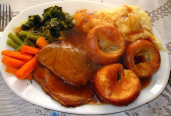
Yorkshirian: Traditional sunday dinner; 27.10.07
Despite the fact that England isn’t world renowned for its culinary delights, good old blighty has a lot to offer. Gordon Ramsey for instance, who’d forget him? And of course it’s the inventor of the sandwich, so named after the Earl of Sandwich for his portable lunch idea.
Typical / traditional English food:
* Fish and chips — deep-fried, battered fish (usually cod or haddock) with potato chips best from specialist fish and chip shops are very different article from "fish and chips" on a general restaurant or pub menu. Available throughout England and the UK.
* Yorkshire Pudding — or yorkies as known to the locals, a batter pudding served with a roast, usually beef; originally used instead of a plate and eaten with the meal. Giant version often appears on pub menus as a main meal item, with a filling such as beef and onion gravy.
* Toad in the Hole — sausages in Yorkshire pudding batter.
* Steak and Kidney Pie — a suet pudding made with beef steak, kidneys and gravy.
* Lancashire Hotpot — a hearty vegetable and meat stew from Lancashire.
* Cornish Pasty— beef and vegetables in a pastry case. Invented by Cornish tin miners, traditionally the crust was thrown away as this is where the miners held the pasty when eating down the mine due the lack of knives and forks. The tin miners had arsenic on their fingers which is a byproduct of the tin.
* Full English Breakfast — Usually consists of fried bacon, fried eggs, fried sausages, fried bread, fried black pudding, mushrooms, scrambled eggs, baked beans in tomato sauce, and toast and butter - washed down by a large amount of hot strong tea or coffee with milk. Typically, the English perceive the full English breakfast as a suitable meal to consume when hungover after a night of drinking. Any inexpensive café will have "all-day breakfast" on the menu.
Shopping
England, London especially is a shoppers paradise. Oxford Street in London is the worlds busiest street with over 300 shops and boutiques to keep any spendaholic amused for a day or three and many are open late into the evenings and on Sundays. Further North in Sheffield you will find Meadow Hall or “Meadow hell” a large shopping centre catering for all tastes with all the large manufacturing labels on display, it is very busy especially on the run up to Christmas.
what to do when it's flat

Pic: A pint of ale; Author: Clemensfranz; Date: 30.08.07
Walking / Hiking / Climbing
England has many places for walking in the country, which may be called Hill walking or Fell walking in some areas and also some of the best granite climbing in Europe. The Lake District and Peak District are some of the places for more serious walks - see also the itinerary Hikes in the Lake District. The Pennine Way (463km) and Coast To Coast Walk (309km) are the best known long distance walks, and there is also the South Downs Way.
There are Public Footpaths and public bridleways all over the country. People have the right to walk along these and local councils are obliged to maintain records of the routes and keep access open, but do not maintain the paths. Paths are usually signposted where they meet a road, but may not be marked across fields. The paths are shown on the Ordnance Survey Explorer (1/25000) and Landranger (1/50000) maps. Enquire locally for details of the best walks, and what kit (boots, waterproofs etc) you will need.
Drinking - The traditional drinking establishment is the pub (short for public house). These are normally named after local landmarks or events, and most will have a symbol on the sign outside; more recent establishments may poke fun of this tradition (e.g. "The Queen's Head" featuring a portrait of Freddy Mercury, lead singer for the rock band Queen).
Pubs are very good places to meet people if you don’t know any locals. Be warned though, some traditional English pubs can get very rough, and if you are uneasy about seeing big, burly, drunk men shouting, swearing and fighting, its best just to avoid these places. Your only likely find pubs like that if you venture into rougher areas of a town.
There are pubs everywhere, city centre and suburb; large and small towns; village main street and in the middle of nowhere. These have traditionally been the meeting places for local communities for hundreds of years. Some pubs have even become more like restaurants, with a bar area for people waiting to be seated: these types can be less than welcoming to people who just want a drink.
Also, it has recently been suggested that recent changes to the licencing laws have helped them by making it possible for people to stay later in their local pub at weekends, rather than having to go to town to continue the evening. In town centers, the establishments lining the main streets are more of the trendy bar type than pubs: they are often designed for vertical drinking standing near very loud loudspeakers, holding fashionable bottles of lager or alcopops rather than for discussing the finer points of football or beer around a collection of pint glasses on a table.
However, back streets still hide traditional pubs, and most towns have several real ale pubs dotted around, sometimes with a cluster concentrated in a small area on the edge of the town centre.
Although traditional pub licencing laws severely restricted their hours of operation, laws enacted in 2005 allow pubs to request more flexible opening hours. Few pubs have requested anywhere near the "24 hour drinking" that is theoretically possible: as a general rule more traditional pubs will close at 11pm still. Some of the more trendy bars will close nearer to 1am, filling a niche in the market between traditional pub and nightclub. However in most cities and many towns, centrally located pubs and bars will stay open until 02:00 or 03:00, especially on Friday and Saturday nights. Also, at public holiday times, many pubs extend their closing times — especially New Year's Eve.
useful phrase guide.
Some useful phrases and words quite unique to England that might be useful!!
A
* Argy-bargy - Pushing-and-shoving or outright fighting.
* Arse over tit - To fall head over heels.
* Aubergine - Eggplant.
B
* Balls-up - Mistake or error.
* Banger - Sausage or old car.
* Barney - Fight or argument.
* Berk - Idiot or silly person i.e. "you great berk"
* Bint - Derogatory term for a woman.
* Black pudding - Black sausage made from blood.
* Bonce - Head i.e. banged ya bonce.
C
* Cash machine - ATM.
* Chav - Generally a person of low intelligance who wears designer label copies and cheap gold, normally a trouble maker.
* Chip shop or chippy - a place to get good old english fish and chips.
* Chip - Thick cut french fries, hot potato chips.
* Chinwag- chating, talking alot.
* Codswallop - Rubbish, false information i.e your talking codswallop.
D
* Daft - mad, eccentric, derranged. "don't be daft'
* Dogs bollocks - excellent, very good, the best.
* Dosh -money
F
* Faff - Dither about. i.e. "Stop faffing around"
* Fettle - adjust, fix.
* Funfair - Travelling fair with amusements.
G
* Gaff - Home, house, place of residence.
* Gennel - Narrow passage between houses.
* Gormless - Lacking intelligence, vacant.
* Gormy - See gormless.
H
* Higgledy - piggledy - Random, a mess, in disarray.
* Holiday maker - Person on holiday, also known as a "sand digger" in beach towns.
I
* Ice lolly - Frozen juice on a stick.
J
* Jam - fruit compot, preserve, jelly.
* Jam sandwich - Police car, so called because in the past police cars were white with a single red horizontal strip around them, hence appearing like a jam (jelly) sandwich.






